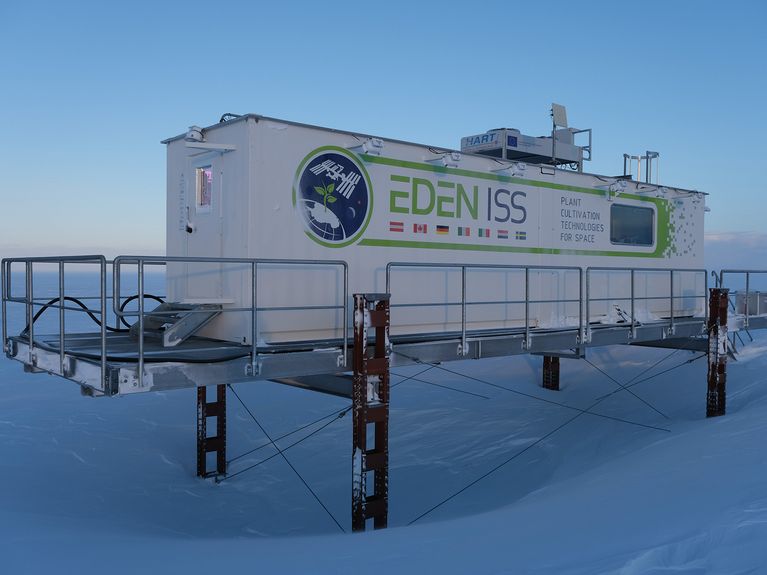
Story #28
From the Antarctic to the Moon – Extreme Plant Cultivation for Space Applications
In the course of its five-year mission in the Antarctic, the DLR greenhouse EDEN ISS produced more than a metric ton of fresh vegetables – for research purposes, and to feed the crews of the AWI’s Neumayer Station III. The project demonstrated how plants can be successfully grown under extreme conditions, without soil or sun.
Fresh vegetables from the South Pole: For five years, the German Aerospace Center (DLR) operated the EDEN ISS greenhouse in the ice desert of the Antarctic. Here, a research consortium experimented with growing plants under extreme conditions – since the eternal ice resembles what would await edible plants in space travel. And the greenhouse produced bountiful harvests: from 2018 to 2023, more than one metric ton of vegetables were grown there – with nothing but artificial light and effective nutrient solutions, and without soil. This approach allowed concepts for growing plants in space to be tested, while also providing fresh food for the overwintering crews of the research station Neumayer III, operated by the Alfred Wegener Institute, Helmholtz Centre for Polar and Marine Research (AWI).
It was the most extensive long-term experiment for future food production on the moon and Mars. EDEN ISS, a closed system that operated independently of the weather, sunlight and seasons, delivered copious harvests with reduced water consumption and without the need for pesticides or insecticides. It also helped researchers gain valuable experience – e.g. with how the cultivation systems worked under the given conditions, how human work steps can be integrated into daily mission routines, and with microbiological aspects in connection with growing and harvesting. Using questionnaires, group discussions, and even a tasting, they also assessed how the availability of fresh vegetables affected the wellbeing of an isolated crew.
EDEN ISS - Rückblick auf 5 Jahre Gemüseanbau in der Antarktis
The close collaboration between the DLR and AWI was essential to the success of EDEN ISS. The AWI not only provided the infrastructure of the Neumayer Station III but also logistical and scientific support. Thanks to this partnership within the Helmholtz Association, the greenhouse was successfully operated, and valuable data was gathered for future food production in an autonomous, closed cycle. The findings can be used not only in the development of life-support systems for extended space missions, but also to optimize food supplies in inhospitable regions of our planet.
In 2023, EDEN ISS returned from the Antarctic to the DLR in Bremen, where the greenhouse will be transformed into EDEN LUNA. Starting in 2026, it will serve as a training module for future missions to the moon at the DLR/ESA LUNA research facility in Cologne. These advances build on the lessons learned in the Antarctic and will prepare astronauts for cultivating plants under lunar conditions.
Picture: DLR